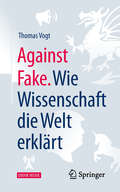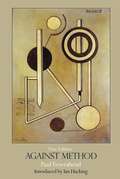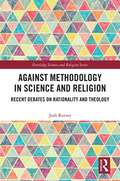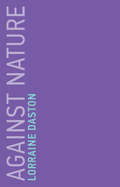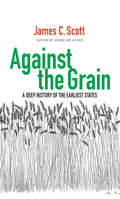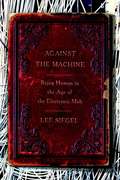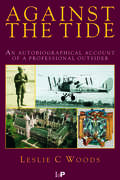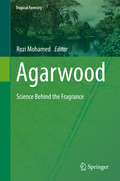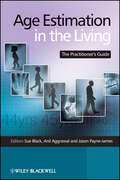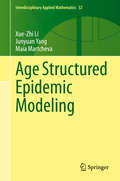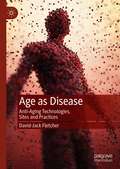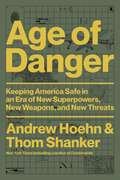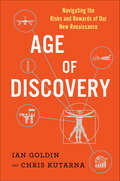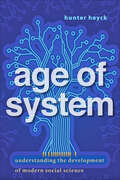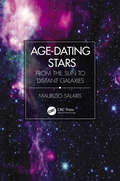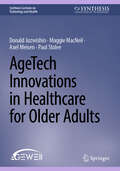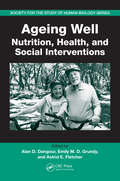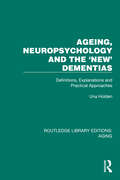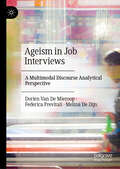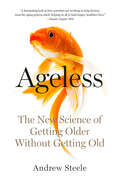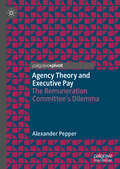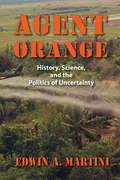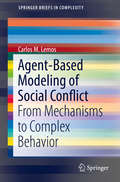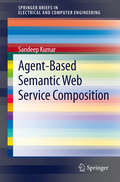- Table View
- List View
Against Ecological Sovereignty: Ethics, Biopolitics, and Saving the Natural World (Posthumanities)
by Mick SmithAgainst Ecological Sovereignty is a passionate defense of radical ecology that speaks directly to current debates concerning the nature, and dangers, of sovereign power. Engaging the work of Bataille, Arendt, Levinas, Nancy, and Agamben, among others, Mick Smith reconnects the political critique of sovereign power with ecological considerations, arguing that ethical and political responsibilities for the consequences of our actions do not end with those defined as human.Against Ecological Sovereignty is the first book to turn Agamben&’s analysis of sovereignty and biopolitics toward an investigation of ecological concerns. In doing so it exposes limits to that thought, maintaining that the increasingly widespread biopolitical management of human populations has an unrecognized ecological analogue—reducing nature to a &“resource&” for human projects. Smith contends that a radical ecological politics must resist both the depoliticizing exercise of sovereign power and the pervasive spread of biopolitics in order to reveal new possibilities for creating healthy human and nonhuman communities.Presenting a stinging critique of human claims to sovereignty over the natural world, Smith proposes an alternative way to conceive of posthumanist ecological communities—one that recognizes the utter singularity of the beings in them.
Against Fake. Wie Wissenschaft die Welt erklärt
by Thomas VogtDie moderne Wissenschaft ist ein faszinierendes Instrument zur Gewinnung von Erkenntnissen über Natur und Kultur. Ihre Ergebnisse sind zwar nicht frei von Widersprüchen, aber den meisten anderen Arten, Wissen zu erzeugen, überlegen. Das liegt an bestimmten Regeln, über die sich Wissenschaftler verständigt haben. Ein zentrales Prinzip von Wissenschaft ist Transparenz. Der Weg zum Wissen soll für alle nachvollziehbar sein, die bereit sind, sich in einen bestimmten Wissensbereich einzuarbeiten. Debatten um Fake News und Alternative Fakten zeigen, wie wichtig transparent erzeugtes Wissen ist. Dabei kann nicht genug betont werden, dass die moderne Wissenschaft als Reaktion auf Aberglauben und Fake entstanden ist. Einen Einstieg in das Thema Wissenschaft zu finden ist schwer, denn das Prinzip der Transparenz darf leider nicht mit Verständlichkeit gleichgesetzt werden. Ziel des Buches ist es, die Idee von Wissenschaft auch Lesern ohne Vorkenntnisse näherzubringen.
Against Method
by Paul FeyerabendPaul Feyerabend's globally acclaimed work, which sparked and continues to stimulate fierce debate, examines the deficiencies of many widespread ideas about scientific progress and the nature of knowledge. Feyerabend argues that scientific advances can only be understood in a historical context. He looks at the way the philosophy of science has consistently overemphasized practice over method, and considers the possibility that anarchism could replace rationalism in the theory of knowledge. This updated edition of the classic text includes a new introduction by Ian Hacking, one of the most important contemporary philosophers of science. Hacking reflects on both Feyerabend's life and personality as well as the broader significance of the book for current discussions.
Against Methodology in Science and Religion: Recent Debates on Rationality and Theology (Routledge Science and Religion Series)
by Josh ReevesSince its development as a field over the last part of the twentieth century, scholars in science and religion have been heavily concerned with methodological issues. Following the lead of Thomas Kuhn, many scholars in this interdisciplinary field have offered proposals that purport to show how theology and science are compatible by appropriating theories of scientific methodology or rationality. Arguing against this strategy, this book shows why much of this methodological work is at odds with recent developments in the history and philosophy of science and should be reconsidered. Firstly, three influential methodological proposals are critiqued: Lakatosian research programs, Alister McGrath’s "Scientific Theology" and the Postfoundationalist project of Wentzel van Huyssteen. Each of these approaches is shown to have a common failing: the idea that science has an essential nature, with features that unite "scientific" or even "rational" inquiry across time or disciplines. After outlining the issues this failing could have on the viability of the field, the book concludes by arguing that there are several ways scholarship in science and religion can move forward, even if the terms "science" and "religion" do not refer to something universally valid or philosophically useful. This is a bold study of the methodology of science and religion that pushes both subjects to consider the other more carefully. As such, it will be of great interest to scholars in religious studies, theology and the philosophy of science.
Against Nature (Untimely Meditations #17)
by Lorraine DastonA pithy work of philosophical aMassachusetts Institute of Technologynthropology that explores why humans find moral orders in natural orders.Why have human beings, in many different cultures and epochs, looked to nature as a source of norms for human behavior? From ancient India and ancient Greece, medieval France and Enlightenment America, up to the latest controversies over gay marriage and cloning, natural orders have been enlisted to illustrate and buttress moral orders. Revolutionaries and reactionaries alike have appealed to nature to shore up their causes. No amount of philosophical argument or political critique deters the persistent and pervasive temptation to conflate the “is” of natural orders with the “ought” of moral orders.In this short, pithy work of philosophical anthropology, Lorraine Daston asks why we continually seek moral orders in natural orders, despite so much good counsel to the contrary. She outlines three specific forms of natural order in the Western philosophical tradition—specific natures, local natures, and universal natural laws—and describes how each of these three natural orders has been used to define and oppose a distinctive form of the unnatural. She argues that each of these forms of the unnatural triggers equally distinctive emotions: horror, terror, and wonder. Daston proposes that human reason practiced in human bodies should command the attention of philosophers, who have traditionally yearned for a transcendent reason, valid for all species, all epochs, even all planets.
Against the Grain: A Deep History of the Earliest States
by James C. ScottAn account of all the new and surprising evidence now available for the beginnings of the earliest civilizations that contradict the standard narrative Why did humans abandon hunting and gathering for sedentary communities dependent on livestock and cereal grains, and governed by precursors of today’s states? Most people believe that plant and animal domestication allowed humans, finally, to settle down and form agricultural villages, towns, and states, which made possible civilization, law, public order, and a presumably secure way of living. But archaeological and historical evidence challenges this narrative. The first agrarian states, says James C. Scott, were born of accumulations of domestications: first fire, then plants, livestock, subjects of the state, captives, and finally women in the patriarchal family—all of which can be viewed as a way of gaining control over reproduction. Scott explores why we avoided sedentism and plow agriculture, the advantages of mobile subsistence, the unforeseeable disease epidemics arising from crowding plants, animals, and grain, and why all early states are based on millets and cereal grains and unfree labor. He also discusses the “barbarians” who long evaded state control, as a way of understanding continuing tension between states and nonsubject peoples.
Against the Machine: Being Human in the Age of the Electronic Mob
by Lee SiegelThe new situation doesn't represent the lack of community suddenly produced by the Internet. That is the hackneyed complaint made, again and again, by people who don't seem to have thought through the unlovely aspects of community- its smug provincialism and punitive conventionalism, its stasis and xenophobia- which was in any case jeopardized and transformed by the advent of modernity two hundred years ago. The simple fact is that sometimes you don't want the quiet conformities induced by community; sometimes you simply want to be alone, yet together with other people at the same time. The old-fashioned cafe provided a way to both share and abandon solitude, a fluid, intermediary experience that humans are always trying to create and perfect. The Internet could have been its fulfillment. But sitting absorbed in your screen world is a whole other story. You are socially and psychologically cut off from your fellow caffeine addicts, but mentally beset by e-mails, commercial pop-ups, and a million temptations that may enchant in the moment- aimed as they are at your specific and immediate interests and desires -but in retrospect are time-wasting ephemera.
Against the Tide: An Autobiographical Account of a Professional Outsider
by L.C WoodsIn Against the Tide: An Autobiographical Account of a Professional Outsider, Leslie Woods relates the fascinating story of his life from fisherman's son in New Zealand to head of the Mathematical Institute at the University of Oxford. After starting at a trade school, he won a scholarship to a university, then joined the RNZAF, and later became a fighter pilot in the Pacific. Following WWII, Woods won a Rhodes scholarship to Merton College in Oxford. He has held positions at the University of New South Wales, Oxford's Balliol College, and Culham Laboratory. Besides recounting his history, Woods explains why magnetic fusion has failed to succeed and outlines the philosophy of science to which he subscribes.
Agarwood: Science Behind the Fragrance (Tropical Forestry)
by Rozi MohamedThis book gives readers new information to understand the mechanism of agarwood induction and therefore eradicate the myths surrounding agarwood formation. One of the challenges in conserving agarwood resources is species identification. In this book, taxonomy and systematics of agarwood-producing trees from historical and recent perspectives is discussed, and tips are given for identifying cultivated species. In addition, color illustrations are given to highlight vegetative and reproductive characteristics as well as anatomical features, for identification purposes of both plant and agarwood sources. Another challenge that planters are facing is in acquiring the correct method for agarwood induction, thus development of agarwood induction technologies will be reviewed. A chapter dedicated to bioinduction is included. The book will comprise a chapter on the use of non-destructive technology as a management tool for cultivating agarwood. The book also discusses issues relating to agarwood grades. The absence of an international standard that is acceptable by producer and consumer countries further complicates the issue. Other useful information includes a systematic revelation of agarwood constituents and their complex chemistry, and highlights on a specific pharmaceutical property.
Age Estimation in the Living
by Jason Payne-James Anil Aggrawal Sue BlackThis book summarizes and explains the main approaches to age estimation in the living, defining when a parameter may be of use and raising awareness of its limitations. This text ensures that practitioners recognize when an assessment is beyond their area of expertise or beyond verification depending upon the clinical data available. Each key approach to age evaluation has been allotted a single chapter, written by an international leader in the particular field. The book also includes summary chapters that relay readily accessible data for use by the practitioner, and includes important "ageing milestones."This book is indispensable where problems of immigration and legal standing, juvenile vs. adult criminal status, and responsibilities of law enforcement to protect vulnerable persons are key issues on a daily basis. Medical practitioners, forensic practitioners such as pathology, odontology, anthropology and nursing, lawyers, and police would find this book incredibly useful.
Age Structured Epidemic Modeling (Interdisciplinary Applied Mathematics #52)
by Maia Martcheva Xue-Zhi Li Junyuan YangThis book introduces advanced mathematical methods and techniques for analysis and simulation of models in mathematical epidemiology. Chronological age and class-age play an important role in the description of infectious diseases and this text provides the tools for the analysis of this type of partial differential equation models. This book presents general theoretical tools as well as large number of specific examples to guide the reader to develop their own tools that they may then apply to study structured models in mathematical epidemiology. The book will be a valuable addition to the arsenal of all researchers interested in developing theory or studying specific models with age structure.
Age as Disease: Anti-Aging Technologies, Sites and Practices
by David-Jack FletcherAge as Disease explores the foundations of gerontology as a discipline to examine the ways contemporary society constructs old age as a disease-state. Framed throughout as ‘gerontological hygeine’, this book examines contemporary regimes, strategies and treatment protocols deployed throughout Australia, the United States, and the United Kingdom. The book deploys critical cultural theories such as biopolitics, somatechnics, ethics, and governmentality to examine how anti-aging technologies operate to problematise the aging body as always-already diseased, and how these come to constitute a movement of abolition, named here as ‘gerontological hygiene’.
Age of Danger: Keeping America Safe in an Era of New Superpowers, New Weapons, and New Threats
by Andrew Hoehn Thom ShankerAn urgent look at how America's national security machine went astray and how it fails to keep us safe—and what we can do to fix it. Again and again, American taxpayers are asked to open their wallets and pay for a national security machine that costs $1 trillion operate. Yet time and time again, the US government gets it wrong on critical issues. So what can be done? Enter bestselling author Thom Shanker and defense expert Andrew Hoehn. With decades of national security expertise between them and access to virtually every expert, they look at what&’s going wrong in national security and how to make it go right. Age of Danger looks at the major challenges facing America—from superpowers like Russia and China to emerging threats like pandemics, cybersecurity, climate change, and drones—and reimagines the national security apparatus into something that can truly keep Americans safe. Weaving together expert analysis with exclusive interviews from a new generation of national security leaders, Shanker and Hoehn argue that the United States must create an industrial-grade, life-saving machine out of a system that, for too long, was focused only on deterring adversaries and carrying out global military operations. It is a timely and crucial call to action—a call that if heeded, could save Americans lives, money, and our very future on the global stage.
Age of Discovery: Navigating the Risks and Rewards of Our New Renaissance
by Ian Goldin Chris KutarnaThe present is a contest between the bright and dark sides of discovery. To avoid being torn apart by its stresses, we need to recognize the fact—and gain courage and wisdom from the past. Age of Discovery shows how.Now is the best moment in history to be alive, but we have never felt more anxious or divided. Human health, aggregate wealth and education are flourishing. Scientific discovery is racing forward. But the same global flows of trade, capital, people and ideas that make gains possible for some people deliver big losses to others—and make us all more vulnerable to one another. Business and science are working giant revolutions upon our societies, but our politics and institutions evolve at a much slower pace. That’s why, in a moment when everyone ought to be celebrating giant global gains, many of us are righteously angry at being left out and stressed about where we’re headed.To make sense of present shocks, we need to step back and recognize: we’ve been here before. The first Renaissance, the time of Columbus, Copernicus, Gutenberg and others, likewise redrew all maps of the world, democratized communication and sparked a flourishing of creative achievement. But their world also grappled with the same dark side of rapid change: social division, political extremism, insecurity, pandemics and other unintended consequences of discovery.Now is the second Renaissance. We can still flourish—if we learn from the first.
Age of System: Understanding the Development of Modern Social Science
by Hunter HeyckIn the years after World War II, a new generation of scholars redefined the central concepts and practices of social science in America.Before the Second World War, social scientists struggled to define and defend their disciplines. After the war, "high modern" social scientists harnessed new resources in a quest to create a unified understanding of human behavior—and to remake the world in the image of their new model man.In Age of System, Hunter Heyck explains why social scientists—shaped by encounters with the ongoing "organizational revolution" and its revolutionary technologies of communication and control—embraced a new and extremely influential perspective on science and nature, one that conceived of all things in terms of system, structure, function, organization, and process. He also explores how this emerging unified theory of human behavior implied a troubling similarity between humans and machines, with freighted implications for individual liberty and self-direction. These social scientists trained a generation of decision-makers in schools of business and public administration, wrote the basic textbooks from which millions learned how the economy, society, polity, culture, and even the mind worked, and drafted the position papers, books, and articles that helped set the terms of public discourse in a new era of mass media, think tanks, and issue networks. Drawing on close readings of key texts and a broad survey of more than 1,800 journal articles, Heyck follows the dollars—and the dreams—of a generation of scholars that believed in "the system." He maps the broad landscape of changes in the social sciences, focusing especially intently on the ideas and practices associated with modernization theory, rational choice theory, and modeling. A highly accomplished historian, Heyck relays this complicated story with unusual clarity.
Age-Dating Stars: From the Sun to Distant Galaxies
by Maurizio SalarisThe determination of stellar ages has been - and still is - crucial for the development of our understanding of the universe, and to constrain theoretical models for the formation of galaxies and the evolution of planetary systems. Stellar ages provide scientists with timescales, and these timescales allow us to identify the relevant physical processes responsible for the development of cosmic structures. This book describes in a simple, yet rigorous, manner the vast array of techniques that have been developed and are currently being used to determine the ages of stars. It also explores how stellar ages inform our knowledge about planets, star clusters, galaxies, even distant galaxies that we cannot resolve into individual stars. Up-to-date with the latest research and technologies in the field, it includes the cutting-edge methods being used based on asteroseismology and discusses open problems that remain to be pondered in future research. It will be of interest to advanced undergraduates and graduate students studying astronomy, in addition to the general public. Key Features Presents an entertaining and accessible approach whilst also providing a rigorous and comprehensive presentation of the subject Describes how to unveil the ages of stellar populations in distant galaxies that we cannot resolve into individual stars Contains historical notes about these techniques, outstanding major problems, and a discussion on future developments in the field
AgeTech Innovations in Healthcare for Older Adults (Synthesis Lectures on Technology and Health)
by Donald Juzwishin Maggie MacNeil Axel Meisen Paul StoleeThis book explores the transformative potential of digital technologies to achieve more effective and integrated health care for older adults. It examines the biological and social processes of aging through personas and scenarios, highlighting their impacts on current and future health care delivery systems. It provides a global perspective on the development of health care systems, discussing barriers and opportunities for reform and innovation within the context of policymaking and health technology assessment. Focusing on home care, rehabilitation, long-term care, and primary care, the book offers insights and tools to enhance these services for older adults. It addresses the critical adoption of standardized electronic health records, emphasizing their importance for accessibility and interoperability within health care systems. Readers are introduced to conceptual models and ethical considerations that frame the challenges and opportunities in health care. The book showcases various AgeTech innovations, pilot projects, and initiatives that can address the health care needs of older adults, improving their independence and quality of life. Additionally, it identifies key areas for future research and innovation in AgeTech, encouraging readers to engage with questions and issues that promote continuous thinking about health care reform and AgeTech integration. Targeting a diverse audience, the book aims to inspire and mobilize business leaders, educators and trainees, researchers, innovators, policymakers, health care providers, and citizens—especially older adults. By presenting evidence and practical strategies, it underscores AgeTech’s role in creating a continuous, integrated, and learning-oriented health care delivery system.
Ageing Well: Nutrition, Health, and Social Interventions (Society for the Study of Human Biology)
by Alan D. Dangour Astrid E. Fletcher Emily M. D. GrundyMany current public health actions and policies aimed at older people revolve around the often prevailing view that failing health is a consequence of ageing. It is now clear that it is possible to postpone or even prevent much of the age-related decline in health that was once thought inevitable. Future policies must recognise this changing paradi
Ageing, Neuropsychology and the 'New' Dementias: Definitions, Explanations and Practical Approaches (Routledge Library Editions: Aging)
by Una HoldenUp to the 1990s, the influence of brain function disturbances and causes of dementia in the elderly had mostly been overlooked as a possible explanation for antisocial or unusual behaviour. As a result, these had tended not to be included in assessment and training programmes.
Ageism in Job Interviews: A Multimodal Discourse Analytical Perspective
by Dorien Van De Mieroop Federica Previtali Melina De DijnThis book investigates age categorizations and stereotyping in job interviews by drawing on a multimodal discourse analytical approach. While previous research on ageism has focused on what happens before or after the job interview, there is substantial evidence supporting the idea that the job interview is a pivotal moment in this respect as well. This is because the way in which the interaction unfolds significantly influences not only recruiters’ ultimate hiring decisions, but also candidates’ interest in pursuing the job offer further. This phase in the recruitment process is thus deserving of further scrutiny when it comes to ageism. The authors delve into age stereotypes regarding ‘old’ as well as ‘young’ age and tease out how they are ‘talked into being’ during job interviews, both by recruiters and candidates. By shedding light on the discursive dynamics of age-based prejudice, stereotyping and discrimination, this books thus aims to further understanding regarding how ageism actually plays out in in real life job interview interactions. The book will be of interest to academics working in fields including interactional sociolinguistics, pragmatics, diversity studies, human resource management and discursive psychology.
Ageless: The New Science of Getting Older Without Getting Old
by Andrew SteeleA startling chronicle by a brilliant young scientist takes us onto the frontiers of the science of aging, and reveals how close we are to an astonishing extension of our life spans and a vastly improved quality of life in our later years.Aging--not cancer, not heart disease--is the true underlying cause of most human death and suffering. We accept as inevitable that as we advance in years our bodies and minds begin to deteriorate and that we are ever more likely to be felled by dementia or disease. But we never really ask--is aging necessary? Biologists, on the other hand, have been investigating that question for years. After all, there are tortoises and salamanders whose risk of dying is the same no matter how old they are. With the help of science, could humans find a way to become old without getting frail, a phenomenon known as "biological immortality"?In Ageless, Andrew Steele, a computational biologist and science writer, takes us on a journey through the laboratories where scientists are studying every bodily system that declines with age--DNA, mitochondria, stem cells, our immune systems--and developing therapies to reverse the trend. With bell-clear writing and intellectual passion, Steele shines a spotlight on a little-known revolution already underway.
Agency Theory and Executive Pay: The Remuneration Committee's Dilemma
by Alexander PepperThis new book examines the relationship between agency theory and executive pay. It argues that while Jensen and Meckling (1976) were right in their analysis of the agency problem in public corporations they were wrong about the proposed solutions. Drawing on ideas from economics, psychology, sociology and the philosophy of science, the author explains how standard agency theory has contributed to the problem of executive pay rather than solved it. The book explores why companies should be regarded as real entities not legal fictions, how executive pay in public corporations can be conceptualised as a collective action problem and how behavioral science can help in the design of optimal incentive arrangements. An insightful and revolutionary read for those researching corporate governance, HRM and organisation theory, this useful book offers potential solutions to some of the problems with executive pay and the standard model of agency.
Agent Orange: History, Science, and the Politics of Uncertainty
by Edwin A. MartiniTaking on what one former U.S. ambassador called "the last ghost of the Vietnam War," this book examines the far-reaching impact of Agent Orange, the most infamous of the dioxin-contaminated herbicides used by American forces in Southeast Asia. Edwin A. Martini's aim is not simply to reconstruct the history of the "chemical war" but to investigate the ongoing controversy over the short- and long-term effects of weaponized defoliants on the environment of Vietnam, on the civilian population, and on the troops who fought on both sides. Beginning in the early 1960s, when Agent Orange was first deployed in Vietnam, Martini follows the story across geographical and disciplinary boundaries, looking for answers to a host of still unresolved questions. What did chemical manufacturers and American policymakers know about the effects of dioxin on human beings, and when did they know it? How much do scientists and doctors know even today? Should the use of Agent Orange be considered a form of chemical warfare? What can, and should, be done for U.S. veterans, Vietnamese victims, and others around the world who believe they have medical problems caused by Agent Orange? Martini draws on military records, government reports, scientific research, visits to contaminated sites, and interviews to disentangle conflicting claims and evaluate often ambiguous evidence. He shows that the impact of Agent Orange has been global in its reach affecting individuals and communities in New Zealand, Australia, Korea, and Canada as well as Vietnam and the United States. Yet for all the answers it provides, this book also reveals how much uncertainty--scientific, medical, legal, and political--continues to surround the legacy of Agent Orange.
Agent-Based Modeling of Social Conflict: From Mechanisms to Complex Behavior (SpringerBriefs in Complexity)
by Carlos M. LemosThis Brief revisits and extends Epstein's classical agent-based model of civil violence by considering important mechanisms suggested by social conflict theories. Among them are: relative deprivation as generator of hardship, generalized vanishing of the risk perception ('massive fear loss') when the uprisings surpass a certain threshold, endogenous legitimacy feedback, and network influence effects represented by the mechanism of dispositional contagion. The model is explored in a set of computer experiments designed to provide insight on how mechanisms lead to increased complexity of the solutions. The results of the simulations are compared with statistical analyses of estimated size, duration and recurrence of large demonstrations and riots for eight African countries affected by the "Arab Spring," based on the Social Conflict Analysis Database. It is shown that the extensions to Epstein's model proposed herein lead to increased "generative capacity" of the agent-based model (i. e. a richer set of meaningful qualitative behaviors) as well the identification of key mechanisms and associated parameters with tipping points. The use of quantitative information (international indicators and statistical analyses of conflict events) allows the assessment of the plausibility of input parameter values and simulated results, and thus a better understanding of the model's strengths and limitations. The contributions of the present work for understanding how mechanisms of large scale conflict lead to complex behavior include a new form of the estimated arrest probability, a simple representation of political vs economic deprivation with a parameter which controls the `sensitivity' to value, endogenous legitimacy feedback, and the effect of network influences (due to small groups and "activists"). In addition, the analysis of the Social Conflict Analysis Database provided a quantitative description of the impact of the "Arab Spring" in several countries focused on complexity issues such as peaceful vs violent, spontaneous vs organized, and patterns of size, duration and recurrence of conflict events in this recent and important large-scale conflict process. This book will appeal to students and researchers working in these computational social science subfields.
Agent-Based Semantic Web Service Composition (SpringerBriefs in Electrical and Computer Engineering)
by Sandeep KumarAgent-based Semantic Web Service Composition closely examines the various aspects of SWS composition, and explores the concept that a Multi-Agent system can serve as an SWS composition system in which its agents can interact with one another to satisfy a high-level goal. In addition to surveying various proposed multi-agent-based SWS composition models, the book also highlights the cognitive parameter-based semantic web service selection models that can be used in multi-agent-based SWS composition, and outlines a new negotiation agreement-based SWS composition that can outperform existing techniques. Agent-based Semantic Web Service Composition is intended for researchers and practitioners as a reference guide for optimizing SWS composition and implementing multi-agent systems. Instructors and other academics working in a related field will also find the book invaluable.

